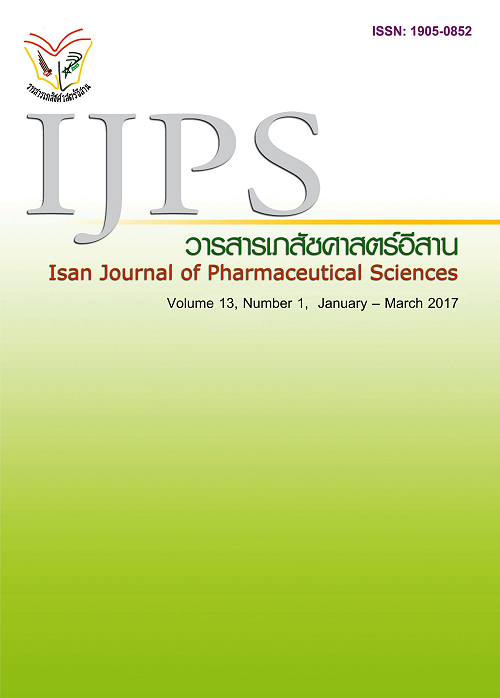ผลการบริบาลทางเภสัชกรรมร่วมกับการเสริมสร้างพลังอำนาจในผู้ป่วยเบาหวานชนิดที่ 2 โรงพยาบาลเมตตาประชารักษ์ (วัดไร่ขิง)
Main Article Content
บทคัดย่อ
กระบวนการเสริมสร้างพลังอำนาจช่วยให้ผู้ป่วยเบาหวานค้นพบศักยภาพของตนเองในการควบคุมโรคและเพิ่มความร่วมมือในการรักษา ในขณะที่การบริบาลทางเภสัชกรรมช่วยค้นหาและแก้ไขปัญหาจากการรักษาด้วยยา การบริบาลทางเภสัชกรรมร่วมกับการเสริมสร้างพลังอำนาจจึงอาจช่วยให้การควบคุมระดับน้ำตาลในเลือดของผู้ป่วยเบาหวานที่ยังควบคุมระดับน้ำตาลไม่ได้มีประสิทธิภาพมากขึ้น วัตถุประสงค์ของการวิจัย: เพื่อเปรียบเทียบผลทางคลินิก ได้แก่ ระดับฮีโมโกลบินเอวันซี (HbA1c) และระดับกลูโคสในพลาสมาขณะอดอาหาร (FPG) ความร่วมมือในการใช้ยา ความรู้ทั่วไปเกี่ยวกับโรคเบาหวานและคุณภาพชีวิตของผู้ป่วยเบาหวาน ก่อนและหลังการได้รับโปรแกรมการบริบาลทางเภสัชกรรมร่วมกับการเสริมสร้างพลังอำนาจ วิธีการดำเนินการวิจัย: การวิจัยกลุ่มเดียววัดผลก่อนและหลังการศึกษาในผู้ป่วยโรคเบาหวานที่มีระดับ HbA1c มากกว่าร้อยละ 7 ระหว่างเดือนเมษายนถึงธันวาคม พ.ศ. 2558 โดยคัดเลือกตัวอย่างแบบเฉพาะเจาะจง 29 รายจากคลินิกเบาหวาน กลุ่มตัวอย่างได้รับการค้นหาปัญหาจากการรักษาด้วยยาและกระบวนการเสริมสร้างพลังอำนาจตามแนวคิดของกิบสัน 4 ขั้นตอน ได้แก่ การค้นพบสถานการณ์จริง การสะท้อนคิดอย่างมีวิจารณญาณ การแสวงหาทางเลือกที่เหมาะสม การคงไว้ซึ่งการปฏิบัติอย่างมีประสิทธิภาพรวม 4 ครั้ง ห่างกันครั้งละอย่างน้อย 1 เดือนตามการนัดของแพทย์ วัดผลทางคลินิกหลัก ได้แก่ ค่า HbA1c วัดความร่วมมือในการใช้ยาโดยใช้ทั้งการนับเม็ดยาและแบบสอบถามความร่วมมือในการใช้ยาของมอริสกี้และคณะ แบบ 4 ข้อ ความรู้ทั่วไปเกี่ยวกับโรคเบาหวานใช้แบบวัดความรู้ทั่วไปเกี่ยวกับโรคเบาหวานของศุภกิจ วงศ์วิวัฒนนุกิจ และคุณภาพชีวิตของผู้ป่วยเบาหวานใช้แบบวัดคุณภาพชีวิตของผู้ป่วยโรคเบาหวาน 39 ข้อหรือ D-39 ผลการศึกษา: เมื่อสิ้นสุดการศึกษาค่าเฉลี่ย HbA1c และ FPG ลดลงอย่างมีนัยสำคัญทางสถิติที่ p < 0.001 ( 9.4% กับ 8.0% และ 232 กับ 173 mg/dL ตามลำดับ) ซึ่งสอดคล้องกับค่าเฉลี่ยความร่วมมือในการใช้ยาโดยวิธีนับเม็ดยาที่เพิ่มขึ้นจากร้อยละ 75 เป็นร้อยละ 91 และค่ามัธยฐานคะแนนความร่วมมือในการใช้ยาของมอริสกี้เพิ่มขึ้นจาก 1 เป็น 4 ตามลำดับ อย่างมีนัยสำคัญ (p < 0.001) คะแนนความรู้ทั่วไปเกี่ยวกับโรคเบาหวานเพิ่มขึ้นจาก 15 เป็น 21 คะแนนอย่างมีนัยสำคัญ (p < 0.001) และคะแนนคุณภาพชีวิตเพิ่มขึ้นอย่างมีนัยสำคัญทางสถิติที่ p < 0.001 ในทุกมิติยกเว้นมิติทางเพศสัมพันธ์ สรุปผลการวิจัย: การบริบาลทางเภสัชกรรมร่วมกับการเสริมสร้างพลังอำนาจอาจช่วยให้ผู้ป่วยเบาหวานชนิดที่ 2 ที่มีระดับน้ำตาลในเลือดสูงควบคุมระดับน้ำตาลได้ดีขึ้น ความร่วมมือในการใช้ยา ความรู้เกี่ยวกับโรคและการใช้ยาเพิ่มขึ้นและมีคุณภาพชีวิตที่ดีขึ้น
Article Details
กรณีที่ใช้บางส่วนจากผลงานของผู้อื่น ผู้นิพนธ์ต้อง ยืนยันว่าได้รับการอนุญาต (permission) ให้ใช้ผลงานบางส่วนจากผู้นิพนธ์ต้นฉบับ (Original author) เรียบร้อยแล้ว และต้องแนบเอกสารหลักฐาน ว่าได้รับการอนุญาต (permission) ประกอบมาด้วย
เอกสารอ้างอิง
Aekplakorn W, Chariyalertsak S, Kessomboon P, et al. The Thai National Health Examination Survey IV Study Group. Prevalence and Management of Diabetes and Metabolic Risk Factors in Thai Adults: The Thai National Health Examination Survey IV, 2009: Diabetes Care ; 2011.
Amklang W, Muangsom N. Effectiveness of an Empowerment and Social Support Program on Self-Care in Diabetes Mellitus Type 2 Patients in Nongrua District, Khon Kaen Province. KKU Research Journal (GS) 10(4): October- December 2010. 87-96.
Balkrisnan R, Rajagopalan R, Camacho FT. Predictors of Medication Adherence and Associated Health Care Costs in an Older Population with Type 2 Diabetes Mellitus : a Longitudinal Cohort Study. Clin Ther 2003; 25(11): 2958-71.
Beckman HB, Frankel RM. The Effect of Physician Behavior on The Collection of Data. Ann Intern Med 1984; 101: 692-6.
Boonyuen N. The Effect of Empowerment Process on Self-Care Behaviors and Levels of Hemoglobin A1c in Elderly Diabetic. [Master of Nursing Science thesis]. Phitsanulok: Naresuan University; 2006.
Buraphan R, Muangsom N. Factors Affecting Uncontrolled Type 2 Diabetes Mellitus of Patients in Sangkhom Hospital, Udonthani Province. KKU Journal for Public Health Research 2013; 6 (3): 102-109.
Bureau of Non Communicable Disease. Non-Communicable-Disease-Data [Online]. 2013 [Cited 2015 DEC 20].Available from: http://www.thaincd.com/information-statistic/non-communicable-disease-data.php.
Chareansakkajon P. The Effect of Family Empowerment on The Diabetic Type 2 Patients’ HbA1c Levels, Readmission , Caregivers’ Powerlessness and Caring Behaviors. [Master of Nursing Science thesis]. Khon Kaen: Khon Kaen University ; 2007.
Choe HM, Mitrovich S, Dubay D, et al. Proactive Case Management of High-Risk Patients with Type 2 Diabetes Mellitus by a Clinical : A Randomized Controlled Trial. Am J Managed Care 2005; 11: 253-60.
Choowattanapakorn T, Suriyawong S. The View of Illness among Older Persons with Diabetes Mellitus. TJN C 2011; 26(4): 96-107.
Department of Medical Records. Mettapracharak (Watraikhing Hospital).
Gibson GH. The Process of Empowerment in Mothers of Chronically Ill Children. JAN 1995; 21(2): 1201-1210.
Gibson GH. A Concept Analysis of Empowerment. JAN 1991; 16 (2): 354-361.
Helper CD, Strand LM. Opportunities and Responsibilities in Pharmaceutical Care. Am J of Hos Pharm 1990; 47(3): 533-543.
International Diabetes Federation (IDF). Diabetes Atlas Seventh Edition [Online]. 2015 [Cited 2015 DEC 20] Available from: http://www.diabetesatlas.org/.
Jaturapattarapong W, Sakthong P. Outcomes of Medication Management in Diabetic Outpatients. TPHSJ 2013; 8(4): 133-142.
Kerdsiri K. The Influence of Risk Factors for Drug-Related Problems on Clinical Outcomes in Diabetic Out Patients at Mahasarakham Hospital. [Master of Pharmacy]. Bangkok: Chulalongkorn University; 2006.
Khoyun S. Effects of Empowerment in Patients with Diabetes Melitus Type 2 and Their Families on Their Perception of Control in Illness Management. [Master of Nursing Science thesis]. Khon Kaen: Khon Kaen University; 2007.
Kozma CM, Reeder CE, Schulz RM. Economic Clinical and Humanistic Outcomes: A Planning Model for Pharmacoeconomic Research. Clin Ther 1993; 15(6): 1121-1132.
Mahawarakorn S. The Effectiveness of The Empowerment to Control Blood Sugar on Personal Self-Care with Diabetes Mellitus Type 2, and Complication Patients, Udornthani Hospital, Udornthani Province. [Master of Public Health thesis]. Khon Kaen : Khon Kaen University; 2008.
Muangkum A, Suttajit S. Effect of Patient Empowerment on Self-efficacy, Adherence and Glycemic Control in Patients with Type 2 Diabetes.TPHSJ 2013; 8(3): 104-111.
Odegard PS. Caring for Poorly Controlled Diabetes Mellitus: A Randomized Pharmacist Intervention. Ann Pharmacother 2005; (39): 433-440.
Pavasudthipaisit A, Awiphan R, Niwatananan K, et al. Explanatory Model for Caring Diabetic Patients by Clinical Pharmacists. THJHP 2009; 19(1): 28-42.
Poolsup N, Auyprasert P. Impact of Pharmaceutical Care on The Number of Drug-Related Ploblems and Fasting Plasma Glucose in Diabetic Patients. SWUJ Pharm Sci 2015; 10(1): 10-16.
Poolsup N, Luckanajantachote P, Suksomboon N, et al. Impacts of Self-efficacy Training Program on Glycemic Control in Type 2 Diabetic Patients. TJHP 2006; 16(1) Jan-April: 30-37.
Poolsup N, Suksomboon N, Intarates M. Effect of Pharmacist’s Interventions on Glycemic Control in Diabetic Patients: A Systematic Review and Meta-analysis of Randomized Controlled Trials. MUJPS 2013; 40(4), 17-30.
Potisat S, editor. Thailand Medical Service Profile (2011-2014) First edition Department of Medical Services. Ministry of Public Health : 6-15.
Sarinnapakorn V, editors. Case Approach for Diabetes Mellitus Management. Bangkok : Bangkok Wetchasan Printing House; 2013. 24-34.
Siri T. Empowerment Program with Goal Setting for Type 2 Diabetes Patients’ Self-care Behaviors at Somdejprajoataksinmaharaj Hospital, Tak province. [Master of Public Health Thesis]. Nakornpathom: Mahidol University; 2008.
Songraksa K, Lerkiatbundit S. Development of Disease Specific Quality of Life Instrument: Thai version of Diabetic-39. [Master of Pharmacy]. Songkla : Prince of Songkla University; 2009.
Suksomboon N, Luckanajantachote P, Poolsup N, et al. Effects of Training Programme on Perceived Self-Efficacy, Self-Care Behavior and Diabetes Knowledge Among Type 2 Diabetics. SWUJ Pharm Sci 2005; 10(2):145-53.
Suradechawut C, Amrumpai Y, Treesak C. Empowerment Process for Individual Diabetic Patients. [Master of Pharmacy]. Nakhonpathom: Silpakorn University; 2010.
WHO Thailand. WHO Statistical Profile [Online]. 2015 [Cited 2015 May 20]. Available from: http://www.diabassocthai.org/sites/default/files/tha.pdf.
WHO. Adherence to Long-term Therapies : Evidence for Action. 1st ed. Sabate E, ed. Switzerland: WHO Publication; 2003.
Wongwiwatthananukit S, Krittiyanunt S, Wannapinyo A. Development and Validation of an Instrument to Assess The General Knowledge of Patients with Diabetes. TJPS 2004; 28(1-2): 17-29.
Yoon KH, Lee JH, Kim JW, et al. Epidemic Obesity and Type 2 Diabetes in Asia. Lancet 2006; 368:1681-1688.


